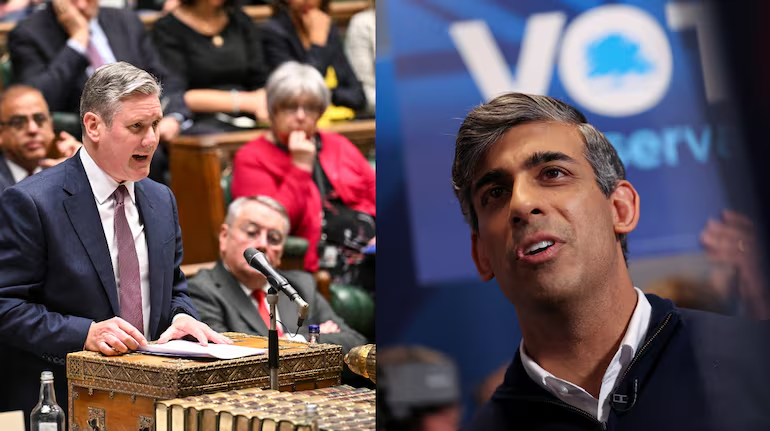United Kingdom 2024 Election: Live Results and Analysis
The 2024 United Kingdom election is a pivotal moment in the country's political landscape, with citizens casting their votes to shape the future direction of the nation. This article provides real-time updates and in-depth analysis of the election results, offering insights into the major parties, key constituencies, and the overall impact of the election on the UK.

The Political Landscape Leading Up to the Election
The political environment in the UK leading up to the 2024 election has been marked by significant changes and challenges. The ruling party has faced scrutiny over its handling of the economy, healthcare, and Brexit negotiations. Meanwhile, opposition parties have gained traction, promising reforms and a new direction for the country.
Major Parties and Their Campaigns
-
The Conservative Party: The incumbent party has focused on economic stability and national security. They have campaigned on a platform of reducing taxes, increasing funding for the NHS, and completing Brexit negotiations with favorable terms.
-
The Labour Party: The primary opposition has emphasized social justice, healthcare, and education. They have proposed significant investments in public services and a more equitable economic policy.
-
The Liberal Democrats: Advocating for a more centrist approach, they have focused on rejoining the EU, climate change, and education reforms.
-
The Green Party: With a growing base, they have centered their campaign on environmental sustainability, renewable energy, and social equity.
-
The Scottish National Party (SNP): Strong in Scotland, they continue to push for Scottish independence and greater autonomy.
Key Constituencies to Watch
-
London: Traditionally a Labour stronghold, but with significant Conservative support in outer boroughs. Key constituencies include Westminster, Kensington, and Battersea.
-
Manchester: Another Labour-dominated city, but with notable competition from the Conservatives and Liberal Democrats in suburban areas.
-
Scotland: Dominated by the SNP, with key battles in Edinburgh, Glasgow, and rural constituencies.
-
Northern Ireland: The political landscape here is unique, with the Democratic Unionist Party (DUP) and Sinn Féin being the major players.
-
Wales: Labour traditionally strong, but with increasing Conservative and Plaid Cymru presence.
Early Voting Trends
As the polls open, initial trends show a high voter turnout, indicative of the election's significance. Early votes from key constituencies suggest a close race between the major parties, with the possibility of a hung parliament. The counting process is rigorous, ensuring every vote is accurately recorded.
Live Results and Analysis
London
- Westminster: A marginal seat with a history of fluctuating between Conservative and Labour. Early results indicate a neck-and-neck race, with Labour slightly ahead.
- Kensington: Traditionally Conservative, but recent trends show a potential Labour gain, driven by younger voters.
- Battersea: A Labour stronghold facing significant Conservative competition. Early results suggest Labour maintaining its lead.
Manchester
- Central Manchester: Strong Labour presence, with initial results confirming their dominance.
- Salford: Labour holding a comfortable lead, with minor gains by the Liberal Democrats.
Scotland
- Edinburgh South: A competitive seat between Labour and SNP. Early results show SNP taking a slight lead.
- Glasgow North: Predominantly SNP, with Labour making minor inroads.
Northern Ireland
- Belfast North: A closely contested seat between DUP and Sinn Féin. Early results are too close to call.
- Derry: Sinn Féin holding a significant lead, continuing their strong presence.
Wales
- Cardiff Central: Labour maintaining a solid lead, with Conservative gains in suburban areas.
- Swansea West: Labour stronghold, with early results confirming their dominance.
Implications of the Results
The 2024 election results will have far-reaching implications for the UK's future. A Conservative victory would likely mean a continuation of current economic and Brexit policies, with potential shifts in healthcare and education. A Labour win would signal a significant change in direction, focusing on social justice and public service investment.
A hung parliament, however, would lead to coalition negotiations, potentially involving smaller parties like the Liberal Democrats or the Greens. This scenario could bring a more centrist approach to governance, with compromises on key issues.
Reactions from Political Leaders
As the results come in, statements from political leaders provide insight into their perspectives:
- Prime Minister (Conservative Party): "We respect the democratic process and await the final results with confidence."
- Labour Leader: "This election is about change and hope for a better future. We are optimistic about the outcome."
- Liberal Democrats Leader: "The British people deserve a government that truly represents their interests. We are ready to be a part of that change."
Voter Sentiment and Key Issues
Throughout the campaign, key issues have emerged as central to voter sentiment:
- Economic Stability: Voters are concerned about the cost of living, job security, and economic growth.
- Healthcare: The NHS remains a top priority, with calls for increased funding and reform.
- Brexit: The handling of Brexit continues to influence voter decisions, with divided opinions on the outcome.
- Climate Change: Environmental policies have gained prominence, especially among younger voters.
- Social Justice: Issues of equality, education, and social welfare are pivotal, influencing the Labour and Green vote.
The 2024 United Kingdom election is a defining moment for the country, with results that will shape its future trajectory. As we continue to monitor live updates and analyze the outcomes, it is clear that the nation's political landscape is at a crucial juncture. The electorate's voice will determine the path forward, influencing policies and governance for years to come.


You must be logged in to post a comment.